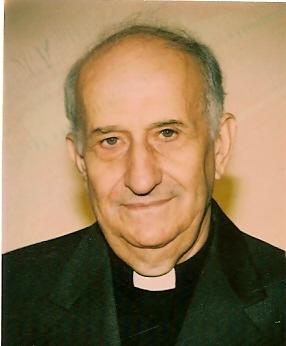Daniel Comboni
Comboni Missionaries
Institutional area
Other links
Newsletter
In Pace Christi
Battelli Giovanni
Fr. Giovanni Battelli was born in Cesena, in the Province of Forlì, on 6 October, 1921. Having finished his secondary studies in the diocesan seminary of Cesena, he went to the regional seminary at Bologna and, two years later, joined the novitiate at Venegono where he made his first profession on 7 October, 1941. Due to the war, he did the first two years of theology at Verona and the final two at Rebbio (Como). He was ordained at Rebbio on 29 June, 1945.
After ordination he was sent to study in Rome where he obtained a “Licentiate in Canon Law” at the Gregorian University. He then went to teach Canon Law and Church History first at the Verona scholasticate and then at Venegono (1947-1951). Teaching was to be his main occupation in Italy, in the NAP, in Ethiopia and in Kenya.
In 1951 he was sent to Cincinnati in the North American province as a teacher and formator of scholastics. Fr. Giacomo Bellini, a former student of his, writes: “In dealing with people he had the manners and courtesy of a distinguished person. His talents and culture gave him unusual standing wherever he might be. The group of scholastics at that time was composed of students of philosophy and theology from Italy, the United States, South America and the Philippines. His humanity placed everyone at their ease. He attributed great importance to the rules as the norm of religious life”.
In 1959, Fr. Giovanni was elected Assistant general and Vicar general. He held these posts for ten years with Fr. Gaetano Briani as Superior General. It was a period rich in vocations and new seminaries were opened in Mexico, Spain, Brazil, Italy and Eritrea and also novitiates and scholasticates. In 1961, the publication of “Archivio Comboniano” began as did the Renewal Course. It was the time when the first contacts with the MFSC (the German-speaking branch of the Comboni Missionaries) were being made. “Fr Giovanni – writes Fr. Vincenzo Milani – closely followed the work of preparation for reunion as he did the work of the Central Commission for the revision of the Constitutions set up in October, 1967.” Missions were opened in French-speaking countries due to the expulsion of our missionaries from Sudan which peaked in 1964. This was the beginning of the missions in Togo, Burundi, Central Africa and Congo, then called Zaire, where four of our confreres were martyred in 1964. Assisted by Mgr. G. Moioli, there was also the return to Ethiopia from which our confreres were forced to leave in 1964, due to the II world war. In 1967, ten missionaries were expelled from Uganda.
At the end of his mandate as Vicar general in 1970, he was elected Regional Superior of Eritrea and Ethiopia, in charge of the communities of these two nations. Fr. Giacomo Bellini again writes: “He stayed quite a few months in Asmara and then went to the Sidamo region where flourishing missions were springing up. Due to the esteem in which he was held at the College and then among the pioneers in Sidamo, his encouragement and directives were widely accepted and agreed with. One of the initiatives he took was the notable step of building a residence for the Combonis in Addis Abeba. Fr. Giovanni took to heart both the communities of Eritrea and the missions in Sidamo for the rest of his life.
Still in the context of this period, Fr. Pietro Ravasio writes: “For many of us, already veterans in that area, Fr. Giovanni was a great boon. He resided at Addis Ababa but often was to be found in Hawassa. When he began his mandate there were three other communities besides Hawassa; when he left, there were twice as many, one of which was Dilla which – later to be handed over to the Salesians – would become the most extensive Catholic work in the south of Ethiopia. A memorable day for Fr. Giovanni and for the region was 25 June, 1973, when seven Eritrean novices took their first vows: among them were Mgr. Menghesteab Tesfamariam and Fr. Tesfamariam Ghebrescristos”. On the occasion of his Silver Jubilee of priesthood, Fr. Giovanni wrote: “The past 25 years have kept me in touch with many, even all my confreres. My happiest memory is that of the missionary and priestly spirit I found and experienced in my confreres and in the Institute”.
In 1975, he was appointed to the NAP for two years and was then again assigned to Eritrea-Ethiopia. He spent the first four years teaching at Asmara seminary and then worked as local superior and bursar at Addis Ababa.
In 1986, he was appointed to Kenya where he worked for seven years, teaching in Nairobi and at Rongai. For some months he also collaborated with the Apostles of Jesus.
Fr. Giovanni left us two publications: Apostolic Mission: Reflections – On consecrated life (EMI, pp.199, 1991) and The New People of God – The history and purpose of the missionary activity of the Church (1991). English edition: Nairobi, 1994.
In 1995, he was assigned to Italy. After two months in Milan he went to Gordola, Verona, again to Gordola, Rebbio and, lastly, back to Verona at the Centre for Sick Confreres where he passed away on 25 October, 2012.
Da Mccj Bulletin n. 254 suppl. In Memoriam, gennaio 2013, pp. 78-84.

